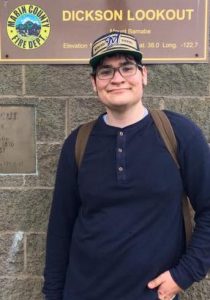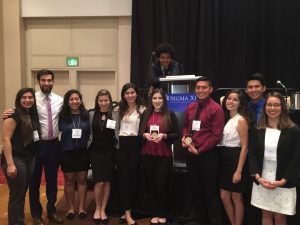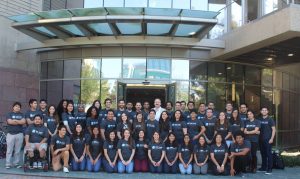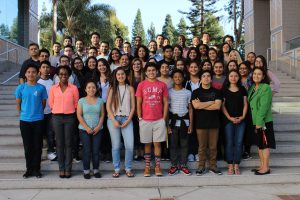Nathan Gamarra graduated from UCI magna cum laude in 2013 with a B.S. in Biochemistry and Molecular Biology. At UCI he worked in the training lab of Dr. Luis Mota-Bravo identifying patterns of antibiotic resistance in bacteria isolated from local oceans and worked towards developing new assays to rapidly detect antibiotics in environmental samples. In the summer of 2011, Nathan did research at Stanford University as part of the Amgen Scholars program. There he studied the biochemical mechanisms of RNA enzymes in the Herschlag lab. After returning to UCI, he joined Dr. Sheryl Tsai’s lab where he studied the molecular mechanisms of fungal enzymes that synthesize important antibiotics and toxins. Nathan is continuing his interest in enzyme mechanism in graduate school, where he is studying the mechanics of ATP-dependent chromatin remodeling enzymes at UC San Francisco. As an undergraduate, Nathan presented posters at several research conferences winning awards at the AAAS conference in 2011 and 2012. In addition to an NSF graduate research fellowship, he was also the recipient of the Dean’s Award for Excellence in Research and the Laurence Mehlman Memorial Scholarship.
Below, we caught up with Nathan to learn about his studies after UCI. He shared invaluable tips on good choices he made early on that helped him become a very competitive candidate for the NSF.
How did you learn about the NSF?
Two ways: I went to an SOP information session on different scholarships.
I was also involved in a Minority Science Program (MSP) through the School of Biological Sciences at UCI. They are fantastic. This program supports students doing undergraduate research, and through them, I learned more about the NSF.
What role did the Minority Science Program play in applying to the NSF?
Dr. Marlene de la Cruz is the Associate Director, and Dr. Luis Mota-Bravo, is the Director of Outreach. They are the two people who run the program there, and they are funded by the National Institute of Health.
Their job is to get people from underrepresented backgrounds into Ph.D programs. So, the program is really geared towards getting people to that goal, and I credit them for all they’ve done to get me there.
When did you first hear about them?
They had sent me an email in my freshman year telling me that I should look into the MSP. I knew UCI was a research-focused university, so I was interested in finding out more and I went to one of their meetings. They told us about research and all the different possibilities that we could pursue. At the time, I was really interested in doing research as an undergraduate, so they set me up with a training lab, and that’s where I learned basic techniques, protocols and things like that.
From there, I worked in other research labs and expanded my experiences. Later, I applied for graduate school.
How many of your peers ended up taking advantage of the NSF or applying for it?
Very few, unfortunately. Many people are intimidated about applying to the NSF in their senior year. The problem is that the application is due at the end of October, right before graduate school applications are due in December. It is also a very competitive fellowship.
Lots of people who would have been very qualified for the NSF, did not apply because they were focused on classes and bunch of other things, but I felt like the application was very similar to a graduate school application, and I knew that I would be applying to graduate school so I essentially decided I was going to do it and it turned out that it worked, and it helped a lot in terms of getting to the schools that I got into.
When you started at UCI did you know that this is what you wanted to do?
No. I knew coming into UCI that I wanted to do something science-related, and I liked biology and chemistry as well. I was deciding between doing something medically-related and something more research-based.
I really liked the courses I was taking and I was interested in the academic aspect of things. Starting with the MSP research program led me down a path that ultimately worked out really well for me.
What are the steps involved in applying for the NSF?
You have your basic application, which includes, letters of rec, transcripts and you also have to write 2 statements. One is a personal one, and the other is a research proposal. The personal statement should address your background, how you got interested in doing science and research, and ultimately, it should touch on your career aspirations and what you’ve done to get there.
The other component is the research proposal. When you are applying as an undergraduate, it can be an intimidating process, but one that is worth it. You have to come up with a project proposal, explain how you would do it, address the results you expect to get, and if you don’t get what you expect, explain what you would do then. This second part is important to address.
It’s important to do as best as you can, but the people who are reviewing your research proposal, they understand that undergraduates don’t have that much experience. They are looking to see if you are actually thinking about what you are doing. The most important thing about your research at this point is that you can communicate what you intend to do. Looking back over it now, my research proposal is definitely not the ideal proposal.
Better to Apply to the NSF as an Undergraduate than as a Graduate Student
I think it is very important to apply as an undergraduate for the NSF fellowship if you are serious about going to graduate school. Having funding early makes your life significantly easier in graduate school since you don’t have to worry about applying for fellowships when you start your program. Applying early also helps your chances as many people don’t apply as an undergraduate. Even if you don’t get the fellowship, it is good practice for applying for the fellowship in graduate school and, since the NSF application is very similar to the graduate school application, it will make that application process a lot easier. Also if you don’t get the fellowship, there is a good chance of getting an honorable mention which will significantly improve your chances of getting the fellowship when you apply as a graduate student. This is really important since you have a limited amount of times you can apply as a grad student.
What graduate program did you decide on?
I am a Ph.D. student at UC San Francisco. Here, the first thing you do as a graduate student is apply for the NSF fellowship. This can be a very stressful process while you are taking classes and working in the lab. For me, having the funding made my transition to graduate school much easier.
If you have any interest in applying for graduate school, you should apply right away. Also, there is a limited number of times you can apply. I think if you apply during your undergraduate program, then you get a second opportunity once you get into a graduate program. All around, I think it’s a really good move for any student going into graduate school in the sciences to apply for the NSF.
Did you look for a mentor or coach to guide the research aspect of your proposal?
Yes, the 2 people in the minority science program coached me. I was working in an undergraduate research lab, (by the way, anyone applying should have worked in, at least, one research lab), and the professor I worked under there, she helped me formulate the research, which was based on my undergraduate project.
What advice would you give a freshman contemplating the sciences and wanting to become a competitive NSF candidate? What do you wish you had known when you first started at UCI and what advice do you have to offer?
Do research early and often and through as many opportunities as you can.
The number one thing that got me the fellowship and got me into graduate school was research experience. That’s one of the great things about UCI, is that it is so welcoming to students who want to do undergraduate research.
I think the biggest barrier as a freshman is intimidation, not knowing things, worrying about not fitting into a lab culture, but you find as soon as you start doing it, that people know and understand where you are. Most people, considering how diverse UCI is, have probably been in your shoes, and so they know that you will find a good lab and good mentors by just seeking them out; there are so many opportunities at UCI, that’s the best thing.
The specific research area does not matter that much. The most important thing is experiencing the lab culture and developing your network of people and research. Through that, you can start finding out if science is what you want to do.
How did you get involved with your first research project? Where did you look for opportunities?
I was super lucky. The MSP was really helpful in terms of helping me through that first barrier, which is getting a lab. The way that they do it is that they have their own training lab where they teach you to do very basic things and get you comfortable, and then after that, you can ask the professor to work in their lab and that’s what I ended up doing.
In addition to the MSP is there another program on campus that can help students prepare for research?
In addition to MSP, there is also, Camp at UCI, which is the California Alliance for Minority Participation. The three-week CAMP Summer Science Academy (CSSA) is a residential program that prepares incoming freshmen for the transition from high school to UCI. To learn more about this program click here.
CAMP is based out of engineering school and they support students across science disciplines. They also help you find people who can help you get into a research lab.
Advice to Freshmen going into the Sciences
I would suggest for the first quarter focus on your classes and on doing well.
The first quarter is a hard transition, but after a quarter or two, once you are comfortable with the academics, just find whatever way you can to get involved with research.
Go to these programs, which were, for me, super helpful. Work with the SOP program. Even if you don’t participate in MSP or CAMP, when you take classes that interest you, talk to professors and ask them if you can work with them. Most professors will be more than happy to help and have you in their lab. Or if they can’t, they may know of other labs that can hook you up with.
Other students found research tips by going online and googling a particular professor.
I didn’t participate in UROP, but lots of my friends did, and it is another great resource.
The Number One thing is Research-Use the Summers to Get Involved
Another thing I credit with my success is my summer research project in the biological sciences. Pretty much every university has an undergraduate research program that you can apply to, and they will pay for you to come out and do research in their lab for the summer.
It’s a really great experience to do research that is normally outside of what you do and most importantly, it is a great opportunity to get a letter of recommendation from someone outside of your university, which I think was a huge deal for me.
I did my undergraduate research program at Stanford for a summer.
It was a great experience. But, like the stress associated with applying to the NSF, some people stress out about applying to summer research programs, but if you get a chance to participate, you will learn invaluable training and you will build a network.
In my case, my Stanford experience got me a letter of recommendation from a professor at Stanford.
Prospective graduate programs definitely noticed. Whenever I interviewed for a graduate school, they asked about my time at Stanford and there were several people knew the professor and commented on the letter he wrote for me. The told me, good job! So it’s a huge plus to do that as well.
How competitive are summer research opportunities?
They can be competitive, but most summer research programs are really interested in supporting people who may not come from perfect backgrounds. They are really committed to increasing diversity and bringing underrepresented students into research and graduate programs.
I encourage everyone to apply.
The other great thing is that those summer research applications are really simple, one or two letters of recommendation and a short personal statement.
Do you pay out of pocket to fly?
The program I applied to paid for everything. The vast majority of programs do. If you apply to the bigger schools most will cover that. In short, this is a huge plus to your CV and applications.
What would you say to a student worried about maintaining a good GPA, and juggling lab, and research work? How to do all the extras and stay a strong student?
I mean, it’s super tough. It won’t be easy the first year.
As far as prioritizing, grades should come first.
I think you want to get things done in research but if you don’t have the grades, research will not matter. It is important, but you need the best grades you can get to get access to good things. Good grades will open more opportunities than maybe extra hours doing a small amount of research.
I would say grades first, but research is also very important.
During the quarters when I took really tough classes, I would come in at least 3 hours less per week because I knew I needed to work on my assignments. Most mentors will understand that your number one priority is classes at that point.
If you can get a project done and publish that would be amazing.
I didn’t do that but I know several people did and that counted for so much for them. However, if your priority is to get into graduate school and fellowships, having the best grades possible is the most important first step.
How did you decide on San Francisco?
It was a tough choice. I applied to many different schools and got into all of them. All the places that I applied to were equally strong in my research field, which made it very difficult to decide. I’d say a very big part in my decision was the location. San Francisco is a cool place to live. I think a big part of your decision should include considering where you see yourself enjoying your life. Having a place that you enjoy living is irreplaceable. It’s the whole experience. Equally important is the atmosphere of the graduate program and how well they support their students. UCSF is an incredibly collaborative and supportive place to work. You get a good feel for this when you interview at different Schools. Graduate school takes a long time to complete, so if you are going to spend 5 years living somewhere, it might as well be a place that you like.
If you would like to contact Nathan for any information on his experiences, please email him at: Nathan.gamarra@ucsf.edu




